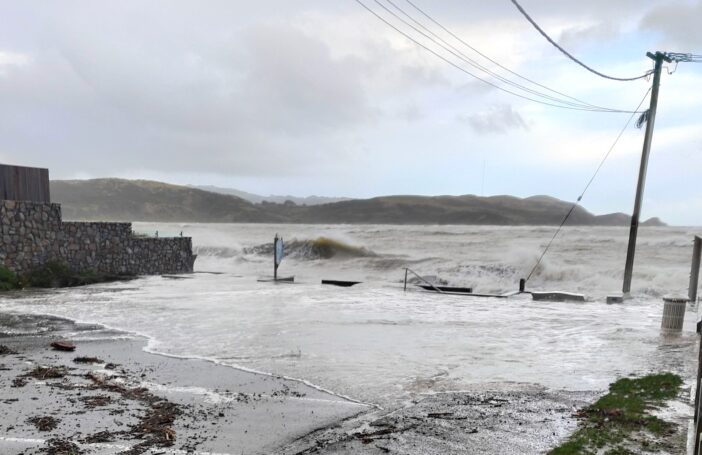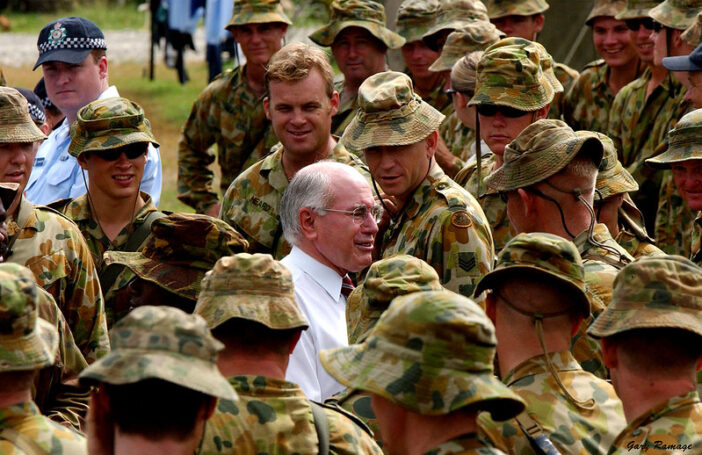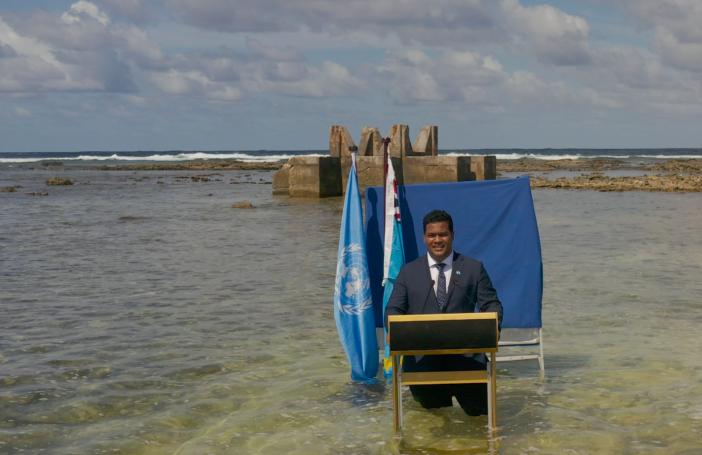This blog is an edited version of the author’s Talbot Oration, delivered at the Australian Museum on 5 June 2024.
I’m honoured and grateful to be given this invitation to tell my story, our story and our journey towards achieving the future we want for ourselves and for our children.
Before I start at the beginning of our campaign journey, I’d like you to note that for us, the Pacific Islands Students Fighting Climate Change, the work we do and the advocacy we carry is greatly shaped and influenced by our Pacific cultural values and our understanding of our different communities.
Growing up in the Reef Islands [of Solomon Islands], I was taught by the aunties and grandmas about the different types of plants available for us to eat, what fruits and plants were edible and which ones were not. I was taught by the uncles, grandpas and my brothers and their friends about how to fish and how to set up traps for the wild birds. Most of all, I was taught about the value that the land adds to our lives, and especially the value we add to the land by looking after it and being aware of our own limits.
I first came to notice the environment that was sustaining my people was disintegrating during one of the trips that we took to my father’s island in South Malaita province. There is an island there called Fanalei Island, and it is located at the port we call Port Adam. During one of the trips to my dad’s island, before we reached home, the sight that greeted me was not the image that I often see whenever I close my eyes and think of Fanalei. I saw that the Fanalei I used to love seeing was no more. There were fewer houses than before. There were no children on the beach playing. It looked deserted, and some of the houses were standing right in the waters. I was young, but very curious about the cause. So I asked my father, and he pointed to the houses and said that the sea level has come into the village, making it difficult for some of the homes to be safe for families, especially during storms. And so the people have had to move to the mainland, abandoning some of the houses.
This interaction was a moment I remembered clearly as the start of my climate justice journey. My curiosity, my love and concern for my people and the eagerness to learn pushed me onto this journey.
In 2016, I chose to study law from the options I had. I remembered I always appreciated law for its ability to govern, regulate and to achieve justice, and so I remember making the decision that I would like to specialise in environmental law one day. My motivation was that I wanted a degree to be relevant to an issue close to home.
In 2017, I commenced my undergraduate studies at the University of the South Pacific. In 2019, my third year of law school, we were given a chance to choose our electives. I remember one of the options was international environmental law, and I registered immediately. It was in that class that our campaign was born.
In class we learnt that some of our people are building sea walls, youth are doing awareness campaigns, and our leaders showing great climate leadership on the international level. When we chose the international environmental law unit, the focus for the majority of us was to understand what the climate change regimes are on the international level so that we could better utilise them to bring about the urgent need and change that we need.
We saw the rate at which the global community was moving towards climate solutions is not proportionate to the pace at which the adverse effects of climate change are hitting our islands. Our communities at the front line of the adverse effects of this climate crisis do not have the luxury to wait for the world to take the climate crisis seriously.
As a class, we researched many different legal pathways. However, the one that resonated well with us was the legal pathway of seeking an advisory opinion from the International Court of Justice, the ICJ. We were convinced that the ICJ Advisory Opinion was the most appealing option, after assessment of the global impact such authority can potentially have for efforts to combat the climate crisis. Once we all agreed on the legal pathway, we then had to decide on who among the class were willing to take this on. I remember 27 students put up their hands and volunteered. It was not for special credit. It was a choice the students had to make on their own. I was one of them.
This was the birth of Pacific Islands Students Fighting Climate Change as a group. This group was born specifically to action our chosen legal pathway. We started getting organised. Online group chats were created, and our first activity as a group was to write letters to all our Pacific island leaders who are members of the Pacific Islands Forum with our proposal.
From all the letters we sent out to all the Pacific leaders, including in Australia and New Zealand, we received an overwhelmingly compelling positive response from one Pacific island nation, the Republic of Vanuatu. The Vanuatu government have always been brilliant visionaries regarding climate leadership.
At the Pacific Islands Forum meeting, in the final communique, Pacific leaders noted our proposal. We were hoping for an endorsement, but in the final text, the leaders noted the proposal “to request a United Nations General Assembly Resolution seeking an advisory opinion from the International Court of Justice”. We were not satisfied with the outcome and were determined to continue campaigning.
After four years of campaigning, working alongside governments, which included group members working on various campaign activities to assist the efforts of the Vanuatu government in building the numbers needed to pass the UNGA vote, our biggest milestone collectively happened on 29 March 2023. On that day, the United Nations General Assembly historically unanimously adopted a resolution to request an advisory opinion from the ICJ, supported by 130-plus countries.
The final question that was asked of the ICJ referred to concepts that we advocated for since 2019 and those are intergenerational equity and human rights. In summary, the final legal question asked the ICJ to consult international law such as human rights law, climate law and environmental law to be considered together, and provide a clarification on states’ obligations to protect the rights of present and future generations and the consequences of breaching these rights.
Since the unanimous adoption in March 2023, the ICJ has invited countries to make submissions before the court, and written submissions were due on 22 March of this year. A total of 90-plus written submissions were received by the International Court of Justice — the greatest number of submissions to be received by the ICJ.
The next phase is the comments phase, and the deadline for this was extended from 24 June this year to 15 August. States that have made written submissions to the ICJ will get an opportunity to comment on the submissions by other states received by the ICJ. Once the comment phase is done, then the next phase is the oral hearing [now confirmed for 2 December 2024].
Overall, we hope for an advisory opinion that is grounded in climate justice and human rights. The world is not taking climate change seriously. Carbon pollution continues to rise as the window for action slowly closes upon us. Vulnerable communities such as mine, who didn’t cause the climate crisis, are already experiencing it. We demand a strong advisory opinion that will uphold climate justice and human rights.
May our journey inspire you to act. Be like the students of the Pacific islands. Reach out to your government through letters. Make the polluters accountable by sharing your voices, sharing your stories, sharing your passion. March with the school students. And if you’re an educator, inspire your students to act, as our lecturer has done for us. Plant trees, get informed about the cause, join the fight in whatever capacity you have and the space that you are in. Do what you can for the same objective that we are trying to achieve, and that is a sustainable future for the present and our future generations. Nothing is too small or too big. The only thing that matters is your contribution to your community. Everything counts.
What I fight for is for my people and our children to live in dignity without the fear of climate change denying them that freedom.
The former Prime Minister of the Republic of Vanuatu, Bob Loughman, summed it up perfectly, and I would like to end with that quote: “This is for the world’s most vulnerable, for all of humanity and our collective future. This is about what we must save, not what has been lost. This is a campaign to build ambition, not division. This is a campaign to uplift the goals of the Paris Agreement. This is the young generation’s call for justice to the world’s highest court.”
The entire Talbot Oration is available to view on the Australian Museum’s YouTube channel.





